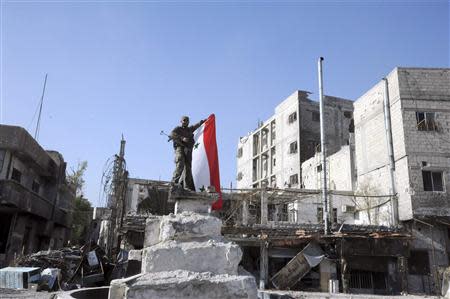Assad's forces make further gains around Damascus

By Khaled Yacoub Oweis AMMAN (Reuters) - Forces loyal to President Bashar al-Assad captured the southern Damascus suburb of Hujaira on Wednesday, part of a broader advance that has brought him major gains south of the capital before proposed international peace talks. Syrian state television and al-Manar, the channel of the Lebanese group Hezbollah whose fighters helped drive rebels out Hujaira, broadcast live footage showing soldiers in control of otherwise empty streets flanked by shelled buildings and ruins. "Southern districts that have been under rebel control for more than a year are falling one by one," Damascus-based activist Rami al-Sayyed said, referring to gains by Assad's forces around the capital. The capture of Hujaira came a day after Islamist rebels in Aleppo declared an emergency and summoned all fighters to confront Assad's forces who have taken towns to the southeast of the contested northern city and also challenged rebel control in the center of Aleppo itself. Since September's deal between the United States and Russia to eliminate Syrian chemical weapons averted the threat of Western attack, Assad's forces have also consolidated control around other cities along Syria's north-south highway such as Deraa and Homs. Large, mostly rural and desert, regions remain under the control of rebel brigades, mainly in the eastern Syria and in the countryside bordering Turkey. Assad's gains put him in an increasingly secure position ahead of proposed - but long delayed - peace talks in Geneva aimed at finding a political solution to the 2-1/2 year civil war. Syrian authorities have scoffed at suggestions he should hand power to a transitional government. FOREIGN FIGHTERS Assad's military resurgence this year has relied to a great extent on support from Shi'ite Iran and fighters from Lebanon's Hezbollah and Iraqi militias, some of them based around a Shi'ite shrine southeast of Damascus. They have helped turn the tide against the Sunni Muslim rebels, whose ranks are increasingly dominated by Islamist fighters and al Qaeda-linked foreign jihadists. "In the last few months Assad has been increasingly leaving the fighting in the urban areas, especially Damascus and its environs, to his Shi'ite allies," a Middle East security official said. "The capture of Hujaira is typical. Syrian army tanks and artillery level the area. The Iraqis and Hezbollah advance and do the fighting. Assad's troops then enter the area and pose for cameras," he added. Hezbollah and its patron Iran do not comment on their operations in Syria. Sayyed, the activist in Damascus, said fighters from the Qatar-backed Ahfad al-Rasul brigade as well as al Qaeda affiliates al-Nusra Front and the Islamic State in Iraq and the Levant, withdrew from Hujaira to Hajar al-Aswad, a dense neighborhood closer to the center of capital, after being pounded by artillery and air strikes for weeks. "There is no unified command and morale has been hit. Hajar al-Aswad and a series of towns in the hands of the resistance in the south and southwest edge of Damascus are now exposed," he said. Rebel sources in Hajar al-Aswad said the fall of Hujaira robs rebels of urban cover but said their defenses in besieged districts closer to the heart of Damascus were solid. Louay al-Dimashqi, an activist well connected with Damascus rebels, said rebels detonated a car bomb on Wednesday at a roadblock in the southern Nisreen quarter, where Hezbollah fighters had deployed along with pro-Assad paramilitary. There were no immediate details of casualties. In Aleppo, rebels battled pro-Assad forces in a second week of street fighting in eastern neighborhoods and in districts closer to the center, opposition sources said. More than 100,000 people have been killed in the increasingly sectarian conflict that has split the Middle East between Sunni powers, including Gulf Arab states and Turkey which support the rebels, and Iran and its Shi'ite allies. Assad, who succeeded his father in 2000, belongs to the Alawite sect, an offshoot of Shi'ite Islam that has controlled Syria since the 1960s. (Reporting by Khaled Yacoub Oweis, Amman newsroom; Editing by Alison Williams)

